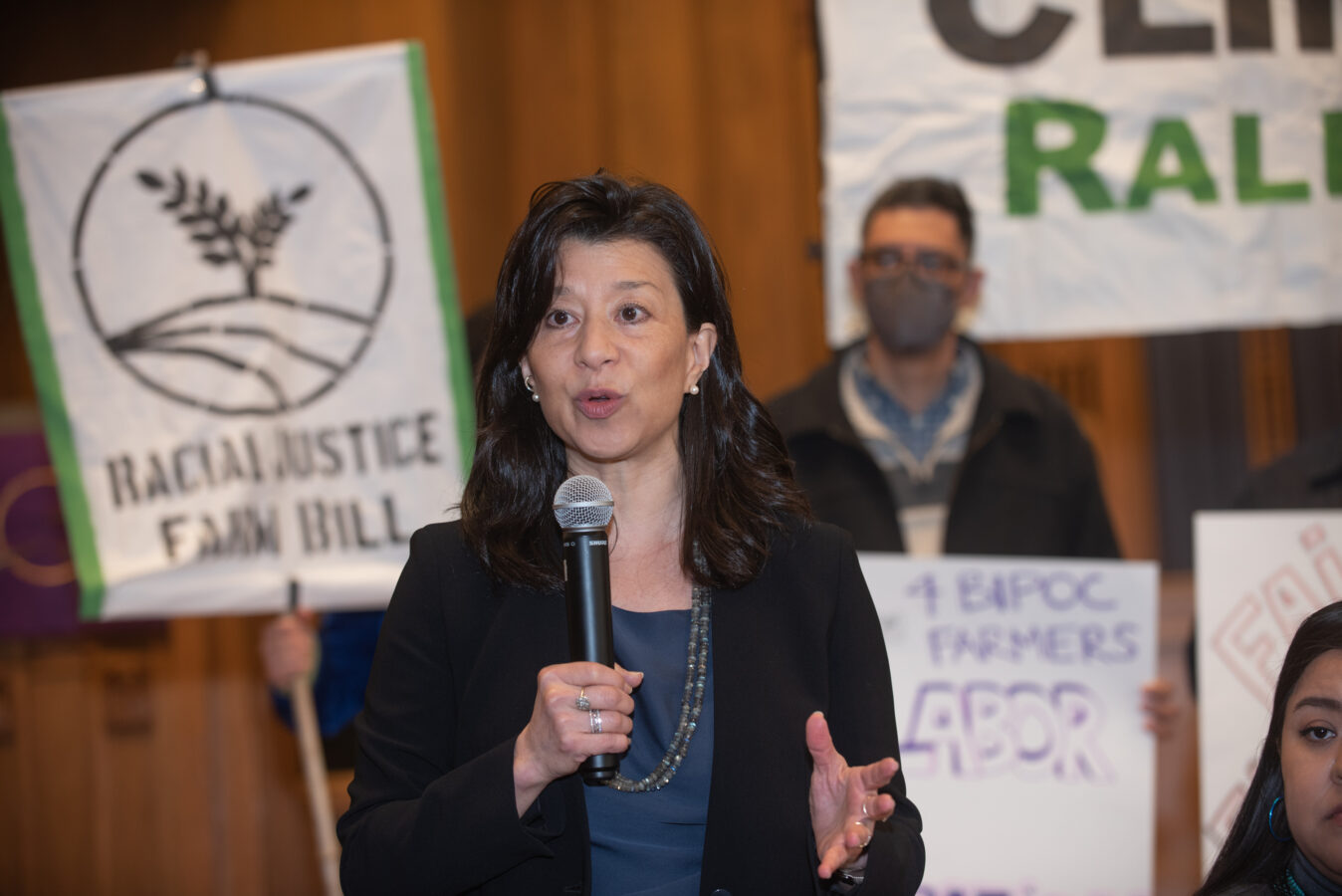Last week, hundreds of farmers and their allies from across the country gathered at the Rally for Resilience to advocate for a Food and Farm Bill that confronts the climate crisis head-on. They were joined by longtime farm advocates John Mellencamp and Willie Nelson, as well as partners from two dozen organizations including the Union of Concerned Scientists. While farmers and scientists may seem like an odd couple, we know that farmers are some of our greatest assets in tackling the climate crisis. Science is a powerful tool to empower farmers to be more sustainable and resilient in the face of a changing climate.
These hardworking men and women took time away from their farms at the start of spring, when preparations for the growing season are well underway, to travel to Washington, D.C. They wanted to make their voices heard because they understand the urgency of the present moment: we are at an inflection point for our climate and our food and farm policy.
Farmers and farmworkers live and work on the frontlines of the climate crisis. Across the country, the increasing frequency and strength of droughts, floods, storms and wildfires puts the health, safety and livelihoods of farmers farmworkers—and the very stability of our food system—at risk.
Climate change and agriculture
California’s megadrought cost the farm sector 14,000 jobs and $1.7 billion in losses in 2021 before a deluge of rain washed away valuable topsoil and delayed planting. Farmers like Lindsay Klaunig of Trouville Farm in Appalachian Ohio and other farmers in in the Midwest and Northeast are trying to cope with a wetter, hotter climate that brings with it new and intensified pests and weeds. In the Southeast, farmers are contending with stronger, more frequent hurricanes that threaten their survival. There is no unaffected region; climate change will impact every piece of food on our plate.
Meanwhile, research by the Union of Concerned Scientists found that without action, between now and 2065 the days when it is simply too hot to work outdoors could quadruple. At the Rally for Resilience, Marielena Vega, a farm worker and chair of Idaho’s Vision 2C Resource Council, shared how rising temperatures are putting farmworkers at risk of heat stress and increasing the danger of toxic pesticides.
These climate impacts disproportionately impact communities of color. Many Latino and Indigenous farmworkers labor in rising temperatures that threaten their health and their lives. Dorathy Barker, co-founder of Operation Spring Plant, Inc. in North Carolina, spoke to generations of discrimination faced by Black farmers on smaller farms. In 1920, Black farmers numbered in the millions. Today, the shameful reality is that there are fewer than 50,000 Black farmers in the United States. Many of them are dealing with narrower margins and fewer resources to prepare for the extreme weather that is already upon us.
We can fix this
This can all feel bleak. But I heard from farmers a persistent honesty, optimism, and hope. Farmers know what they need to build thriving, resilient farms and take on the climate crisis.
 I had the pleasure of being invited to address the Rally for Resilience last week, alongside farmers who took leave of their work during the crucial spring planting season to make their voices heard in Washington, D.C.
I had the pleasure of being invited to address the Rally for Resilience last week, alongside farmers who took leave of their work during the crucial spring planting season to make their voices heard in Washington, D.C.I heard from Yadi Wang, the General Manager at Oatman Flats Ranch about how science-based practices like planting cover crops and perennials, rotational grazing and incorporating forestry into farming can help farmers build healthy, absorbent soils to adapt to a changing climate and store more carbon at the same time. These practices offer larger tangible benefits: UCS research shows they can return roughly $4 in environmental and economic benefits for every $1 invested.
Public investments in food and agriculture research that helps farmers adapt to and mitigate climate impacts also offer big payoffs: The USDA’s Economic Research Service has found that spending on public agricultural research and development generates, on average, $20 in benefits to the US economy for every dollar spent. But research spending has declined by a third since 2002, when we’ve needed it most. It’s not too late to turn that around with investments to optimize climate-friendly farming practices for every region and soil type across this country.
Farmers understand that the quality of our environment determines the health and sustainability of our food. But big corporations have hijacked our food and agriculture system, limiting farmers’ choices, and exacerbating the climate crisis and its effects on workers, and our food, water, and soil. We must be clear-eyed about the ways in which our current agricultural system is contributing to the climate crisis. Agriculture contributed 11 percent of US heat-trapping emissions in 2020 and at least twice as much farm soil is being lost to erosion annually as was lost during the peak of the Dust Bowl—a wasted opportunity for carbon storage that also increases flood and drought risks.
Fighting for a just, climate-smart Food and Farm Bill
We can protect farms, food and workers, and take back control of our food and farms. Our best chance to do this is with the next Food and Farm Bill, up for reauthorization by Congress this year. We need a Food and Farm Bill that protects small and mid-size farmers—especially new farmers and farmers of color—and equips them with the tools to adopt and scale farming practices that protect our climate, while producing nutritious food for communities across this country.
Many Black, Indigenous, and immigrant farmers are experts in farming practices that are key to addressing the climate crisis. Black-owned farms like Soul Fire Farm in Albany, New York are restoring degraded, eroded land and advancing justice and equity in our food system. The next Food and Farm Bill must center the needs of these communities and lean on their expertise. Ensuring their success will build a better food system for all of us.
We cannot afford to wait another half-decade to transform our food system. We need Congress to take bold, science-based action in this Food and Farm Bill. And we need President Biden to insist on bold action in this bill. Farmers know what they need to feed our country. Let’s make sure they have it.

 1 year ago
53
1 year ago
53


